CHHSM Creates Fact-Based Information Campaign to Support Members’ COVID-19 Vaccine Rollout Programs

In order to support CHHSM members’ efforts to help their employees and residents understand the risks and rewards of the COVID-19 vaccines, the UCC’s Council for Health and Human Service Ministries has launched a “Myth vs. Facts” campaign.
Created by the Rev. Elyse Berry, D.Min., CHHSM’s associate for advocacy and leadership development, the campaign aims to plainly state the facts via a series of social media graphics. “One of the main obstructions to vaccinations is misinformation — and a lack of correct information,” Berry says. “It’s vital that CHHSM is a part of the effort to help build understanding on this issue.”
The campaign takes nine popular myths that have gained strength across social media and debunks them. The myths range from the vaccine giving people COVID-19 (It won’t) to reports that the vaccine has a microchip (it doesn’t) and more. Factual, scientific explanations — sourced from the CDC, Mayo Clinic, and CHHSM member Advocate Aurora Health — are given in destroying each myth.
There also is a general lack of vaccine information, Berry adds. Anyone with concerns about the safety of the vaccines, reactions and side effects, or interactions with medications should consult their medical professionals.
An additional obstacle to information is the historic and current mistrust of medical professionals by Black Americans. The mistrust is founded on many occurrences of unethical studies where Black patients were lied to or intentionally given wrong information.
One such incident was the Tuskegee Study on Untreated Syphilis in African-American Men. The study, conducted between 1932 and 1972, centered on Black patients with syphilis who were told they would receive free health care. Instead of the study stopping with the advent of penicillin in 1947, the study continued examining the progression of the disease, and the patients were never treated with penicillin. It ended only after being exposed in the press by journalists.
COVID-19 infection and death rates are higher for African Americans, largely because of expressions of systemic racism such as disparities in economic stability, health care access, bias in medical professionals when Black Americans do go for treatment, higher likelihood of being in essential jobs and living in multigenerational homes, and other social determinants of health, Berry says.

“Given how the infection and death rates have been higher for Black folks since the COVID-19 pandemic began, and that these disparities continue, it may come as a surprise to some to learn about the hesitancy in the Black community to take the vaccine,” she says. “Yet because we have a history of medically abusing Black folks in this country, and have systems that continue to show a complete disregard for Black life and health, it is not surprising at all.”
A study conducted in Fall 2020 by the NAACP, UNIDOS, and the COVID Collaborative found that 41 percent of Black Americans said they knew little or nothing about how vaccines are developed and tested, which has contributed to the confusion also caused by misinformation and conspiracy theories, Berry adds. “Faith communities, including our CHHSM members, have a critical role to play in responding to this pressing issue through the power of trusted relationships — not judgment or coercion.”
Helping to push out facts about the vaccines will aid CHHSM members as they roll out COVID-19 vaccination programs in their settings. “Our members are at various stages in the process of acquiring or administering the COVID-19 vaccine,” says Michael J. Readinger, CHHSM president and CEO. “It is our hope that this information campaign will help employees and residents of CHHSM organizations — as well as the general public — feel comfortable getting the vaccine. As always, though, we advocate consulting your medical professionals with any questions you have.”
Successful COVID-19 Vaccination Rollouts Focus on Education
Many CHHSM members —mostly older adult communities — report that vaccination programs began in late December 2020 or January 2021. Those able to begin vaccination programs noted the importance of a detailed information campaign as a necessary first step in ensuring that most people get vaccinated.
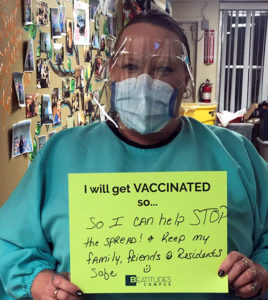
For example, Beatitudes Campus — a Life Plan Community in Phoenix — “circulated information, put information on our website, and talked in three-times-a-week broadcasts to residents about the vaccine to help mitigate vaccine hesitancy,” says Barbara Wood, director of development. President and CEO Michelle Just also spent time talking with employees and residents’ families in order to educate them on the vaccine’s benefits and risks.
“The bottom line is to protect yourself, your coworkers, your community, and importantly, to protect the residents we serve,” Wood says. “Building defenses against COVID-19 is a team effort.”
Tina McLeod, chief marketing officer at United Church Homes and Services in Newton, N.C., echoed the team aspect of beating COVID-19. “We have done a lot of education with our team members, including our medical directors and other providers holding question and answer sessions to help ease fear and uncertainty as it relates to the vaccine,” McLeod says. “Additionally, we have had prominent leadership who suffered from COVID-19 give their personal testimony of how sick they became with the virus to encourage others to take the vaccine. We also provided our employees various educational pieces and posted on social media, too.”
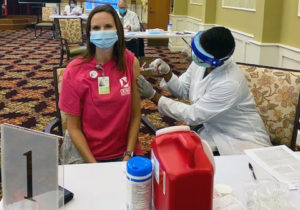
McLeod says the effort has been worth it, as more than 90 percent of residents and staff have already received at least the first of the two vaccines. Although employee acceptance rate has lagged behind residents, it is catching up, McLeod notes. “Many of our staff had been reluctant to take the vaccine at the initial clinics, but have decided — after seeing their coworkers who were vaccinated do well — that they will now take the vaccine,” she says.
The Arcadia Family of Companies, based in Honolulu, also centered in on educating its residents and staff. “We continued to do what we have been doing since the onset of the COVID-19 pandemic — listen, communicate honestly and timely, be transparent, proactive, and follow the science and recommendations of the Department of Health, and our federal regulators and advisors,” says Suzie Schulberg, president and CEO. To date, some 90 percent of residents and 70 percent of employees have been vaccinated.
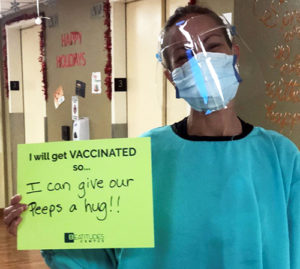
At Bellewood & Brooklawn/Seven Counties Services in Louisville, Ky., the goal is to get as many employees vaccinated as possible. The CHHSM member looks forward to returning “to some sense of normalcy in our operations as soon as it is safe to do so,” says Abby Drane, president and CEO. Vaccinating the employees also will help protect the clients, Drane adds, “so that we can get back to providing mission-critical services in person to the communities we support. We have also really missed having personal interactions with our friends, partners, and supporters, such as the UCC churches.”
Phoebe Ministries, headquartered in Allentown, Pa., started rolling out vaccines last month. “The health and wellbeing of our residents and staff is the highest priority for Phoebe Ministries,” says Donna Schudel, community relations and grants specialist. “Receiving the COVID-19 vaccine is strongly encouraged in order to protect all of the residents we care for.”
Some CHHSM members still await word of vaccine availability in their communities. Bethany Children’s Home in Womelsdorf, Pa., is looking forward to life after the vaccine, even though vaccines currently are unavailable and local providers can’t estimate when supplies will be replenished. Beth Endy, director of human resources, says that the employee vaccination program will be voluntary “based on the supply/availability from our community medical centers.”
Logistics Considered in Arranging Vaccination Clinics
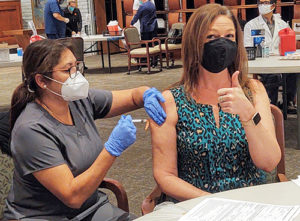
“It is hard to get 700-plus people vaccinated on the same day without a lot of delays and chaos,” says Beatitudes’ President and CEO Just.
To prevent the chaos, Beatitudes Campus had a pre-registration day in order to process all the necessary forms and medical information. That attention to detail helped the vaccination day run efficiently. “When the residents came to the clinic, we pulled their information and guided them to the available vaccinators. The process went smoothly,” Just says.
As of Jan. 29, United Church Homes (UCH), based in Marion, Ohio, has held 21 vaccine clinics in its long-term care and assisted living communities. Many communities have already had their second clinics, and some communities have also been able to vaccinate their independent living residents, says Amy Bonacuse, director of marketing and communications.
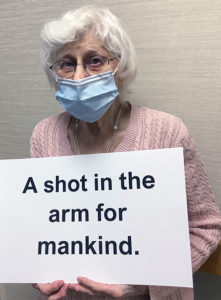
“We’re also grateful that clinics are being scheduled in many affordable housing communities,” Bonacuse says. “We’ve been challenging our community leaders to make the clinics fun and celebratory.” This, she adds, has been an easy accomplishment in many communities.
“We have had a number of centenarians, or those close to 100, get the vaccine,” Bonacuse explains. “These residents were among the first to receive the smallpox vaccines as children, and were happy to receive the COVID-19 vaccine.”
Many residents expressed their thanks to UCH leadership. “Thank you for going to bat for us to get the vaccine,” wrote one. “We are one step closer to getting back to normal,” wrote another.
Families also expressed their thanks. As one family wrote, “Thank you for getting the vaccine to my mom – we are so grateful.” Another resident’s adult child added, “I am so grateful my mom got the vaccine. Maybe we could visit soon.”
Arcadia’s Schulberg says that the vaccinations are an important step. The vaccination program will “move us closer to opening up our world,” she says, “bringing us physically together, and allowing our kupuna [respected elders] to gather with their loved ones.”
Or as United Church Homes and Services’ McLeod notes, “There is one major side effect to receiving the vaccine … it is called HOPE!” she says. “Let’s all do our part in beating this virus and getting back to living life to its fullest.”
Join Our Mailing LIst
Follow on Facebook
Iredell Adult Day Services Hosts Ribbon-Cutting to Celebrate Adult Day Health Certification - CHHSM
www.chhsm.org
Iredell Adult Day Services (IADS) in Newton, N.C. — a nonprofit organization dedicated to caring for older adults, vulnerable groups, and their families, and part of EveryAge — hosted a ribbon cut...